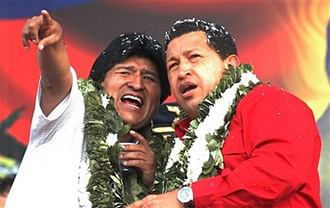 |
 |
 |
 News from Around the Americas | August 2007 News from Around the Americas | August 2007  
Argentina Moves Into Chavez's Oil-Ally Circle
 Martin Arostegui - Washington Times Martin Arostegui - Washington Times
go to original


| | Bolivia's President Evo Morales, left, and Venezuela's President Hugo Chavez wear coca leaf necklaces as they inaugurate the construction of a thermoelectric power plant in the the village of Entre Rios, Bolivia, Friday, Aug. 10, 2007. (AP/Nano Cartagena) |
Santa Cruz, Bolivia — Argentine President Nestor Kirchner edged his country closer to Venezuela's energy-based circle of allies over the weekend, joining Hugo Chavez and Bolivian President Evo Morales at a rhetoric-drenched summit in Bolivia.

Standing side by side at a huge rally in the hydrocarbon-rich eastern province of Tarija, the three announced a series of oil and gas deals, all the while proclaiming plans to extend socialism throughout Latin America.

"The future of Latin America is being played out in Bolivia," Mr. Chavez told assembled peasants at an earlier rally in Mr. Morales' core constituency of Chapare, where Andean Indians voted overwhelmingly for Mr. Morales' Movement Toward Socialism (MAS) party. Bolivia will have all the financial and military assistance it needs, he added.

Indeed, it was a lucrative day for Mr. Morales, who received a promise of $450 million in soft loans from Buenos Aires for a natural-gas processing plant that will service energy-hungry Argentina. Mr. Chavez, meanwhile, pledged most of the financing for a new Venezuelan-Bolivian oil-exploration company, a deal valued by Bolivian Vice President Alvaro Garcia Linera at $600 million.

The Venezuelan president has long used his nation's oil wealth to extend his personal influence through the region, a pattern that appears to be drawing in Mr. Kirchner.

He recently arranged for the purchase of $100 million worth of Bolivian bonds and then, on a visit to Buenos Aires last week, concluded a similar deal with Mr. Kirchner for $500 million in Argentine bonds.

Mr. Morales used the rally to announce that international oil companies — which were nationalized last year — must submit satisfactory investment plans within 10 days or they will be expelled from Bolivia.

Mr. Kirchner, at that point, promised to pick up the slack if the foreign firms are thrown out.

"My dear Evo, my telephone is waiting for your call," he was widely quoted as saying. "If these businessmen don't invest, just pick up the phone and we Argentines are going to come invest with you."

Mr. Chavez, meanwhile, has been embarrassed by the disclosure this week that a Venezuelan official traveled to Buenos Aires a few days before the Venezuelan president, carrying $800,000 in cash. It was reported yesterday that the official picked up the money in briefcases during a stopover in Santa Cruz.

Mr. Chavez's government has confirmed that the person works for Venezuela's state oil company but said he was trading money on his own account.

Bolivian opposition Sen. Oscar Ortiz, however, has charged that the money was intended to "grease palms" in Argentina to smooth the way for the president's visit. He has demanded a full investigation.

Another opposition senator, Carlos Bohrt, has accused the Venezuelan president of seeking control over Bolivia's gas in order to gain political leverage over Brazil and Argentina, the region's two largest economies.

Bolivia has South America's largest hydrocarbon deposits after Venezuela. | 
 | |
 |



